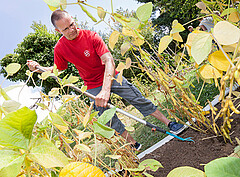The soybean experiment ‘1000 Gardens’: a case study of citizen science for research, education, and beyond [23.07.18]
The team around Volker Hahn incorporated citizen science in a current soybean project and conclude that including normal citizens in scientific research, holds great potential for plant sciences and breeding and can be a powerful research tool to complement traditional approaches.

Over 2,000 gardeners took part in the first round of this project | Picture Source: University of Hohenheim / Sacha Dauphin
Würschum, Tobiasa; Leiser, Willmar La.; Jähne, Felixa; Bachteler, Kristinab; Miersch, Martinb; Hahn, Volkera (2018): The soybean experiment '1000 Gardens': a case study of citizen science for research, education, and beyond. In: TAG. Theoretical and applied genetics. Theoretische und angewandte Genetik. DOI: 10.1007/s00122-018-3134-2. Author
- aState Plant Breeding Institute, University of Hohenheim, Stuttgart, Germany
bTaifun-Tofu GmbH, Freiburg, Germany
Abstract
Citizen science is an approach that includes normal citizens in scientific research, but has so far not been exploited by the various disciplines in plant sciences. Moreover, global threats challenge human well-being and science can provide solutions, but needs to leave the ivory tower in the mind of the broader public. In 2016, we performed the ‘1000 Gardens—the soybean experiment’ citizen science project, that aimed at finding citizens in Germany who would grow soybean lines in their own gardens and evaluate them for a range of traits related to adaptation and agronomic performance. Here, we describe details of this project, i.e. the recruitment, performance, and compliance of the citizen scientists. A total of 2492 citizen scientists volunteered for the project, but through the high media coverage a much broader audience than just the participants was reached. Our 1000 Gardens project was successful in collecting a scientifically unique data set with heritabilities ranging up to 0.60 for maturity date or 0.69 for plant height. Our results suggest that the citizen science approach holds great potential also for plant sciences and can be a powerful research tool to complement traditional approaches. Our project was also successful in raising public awareness about the importance of plant breeding and in communicating key messages on the manifold benefits of legumes for a sustainable agriculture to a broader public. Thus, citizen science appears as a promising avenue to demonstrate the value of breeding and science to the general public by including normal citizens in scientific research. © 2018 The Author(s)
more info here: https://www.1000gaerten.de/index.php?id=2
Back to Knowledge and Views - national


